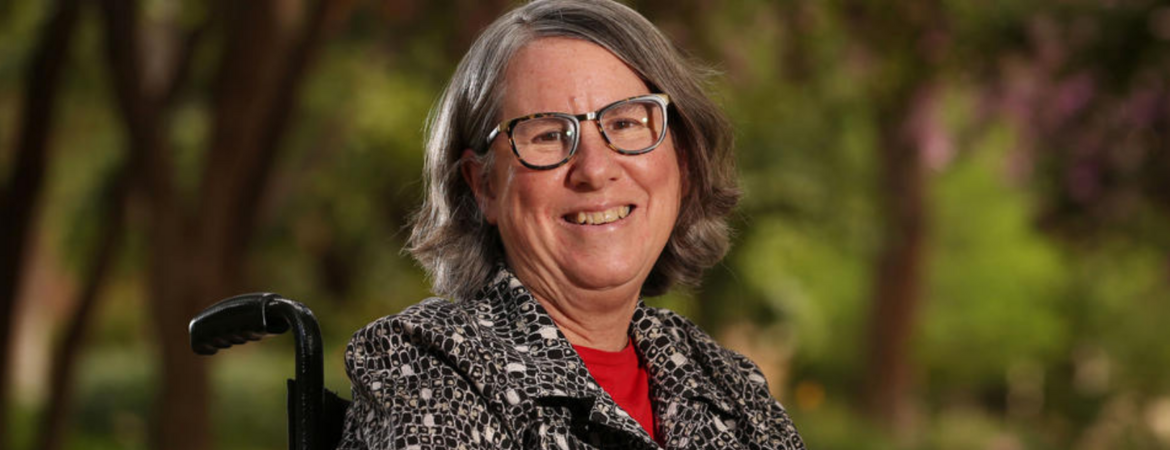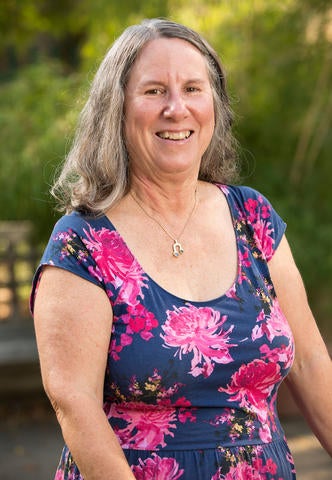
Marilyn Fogel, endowed geoecology professor at UC Riverside, died on May 11 at her home in Mariposa, Calif. She was 69.

She pioneered the use of different forms of the same chemical element, called isotopes, to understand the life history of organisms, both modern and ancient. In so doing, she helped develop biogeochemistry as a new field of science with many seminal papers in the field and earned herself the moniker ‘isotope queen.’
Her work with stable isotopes traced the long-term history of living things not only on Earth, but also helped answer questions about life elsewhere in the universe.
“Consistently innovative, world-class studies across wide-ranging fields are a hallmark of her career, with a diversity of research questions that is unique among the leading biogeochemists and isotope ecologists in the world,” said Gordon Love, chair of UCR’s Department of Earth and Planetary Sciences. “The impact and breadth of Marilyn’s research are extraordinary.”
Her death was the result of amyotrophic lateral sclerosis, often known as Lou Gehrig’s disease or ALS. In life, she was the recipient of the highest honors the scientific community has to bestow.
In 2019, she was elected to the National Academy of Sciences, a rare distinction. According to the Congressional Research Service, there are roughly seven million scientists in the U.S., and only 2,400 of them are members of the national academy.
She was the first woman ever to win the Alfred Treibs Medal in organic geochemistry for lifetime achievement in the field, and was a fellow of the Geochemical Society, the American Association for the Advancement of Science, and the American Geophysical Union.
Though her list of accolades is lengthy, it does not end with awards, fellowships, or publications. She was revered by many at UCR not only for her scientific brilliance but also for her advocacy on behalf of students and colleagues.
“Her ‘let’s take care of this right now,’ doggedness in defending staff, students and junior faculty who felt that they had no voice will be missed. Her pragmatism and ‘let’s get it done’ attitude will be missed. I use the word ‘let’s’ a lot when I think about Marilyn. She was a collaborative person who understood that progress happens when everyone is engaged. I’m a better leader because of Marilyn,” said Kathryn Uhrich, dean of UCR’s College of Natural and Agricultural Sciences.
After earning her doctorate from University of Texas-Austin in botany and marine sciences, she continued on to a postdoc at the Geophysical Lab at the Carnegie Institution of Washington. She remained there as a staff scientist until 2012, then spent three years at UC Merced.
In 2016, Fogel joined UC Riverside’s Earth and Planetary Sciences department as the Wilbur W. Mayhew Professor of Geoecology, and director of the Environmental Dynamics and GeoEcology or EDGE Institute. With Fogel at the helm, the institute helped usher in a generation of new science at UCR across diverse departments spanning geochemistry, environmental sciences, ecology, biology, botany & plant sciences, and biochemistry.
“Her arrival at UCR was a watershed moment, and even though challenged every minute by an insidious disease, she led us toward solutions to some of our greatest problems, the environmental catastrophe of the Salton Sea in particular. She would be pleased to know that this work will continue, building on the foundation she championed right up to the end,” said Timothy Lyons, distinguished professor of biogeochemistry and director of UCR’s Alternative Earths Astrobiology Center.
“I’m absolutely gutted by the loss of a very special colleague, role model, and friend. Marilyn was one of the most creative and generous scientists I’ve known,” Lyons said.
After retiring in summer 2021, she became chair of UCR’s Salton Sea Task Force, a diverse group of scientists from UC Riverside working to explain and help solve the ecological crises at the Salton Sea, California’s largest and most polluted lake.
Colleagues on the task force expressed universal admiration for her leadership skills.
“She was able to bring a multidisciplinary group of people together, which I think is rare in many fields. One thing I noticed in the way she managed the group was to give everyone time to express their opinions. It didn't matter if it was a graduate student or a distinguished professor, she wanted to know what every one of us thought,” said Roya Bahreini, professor of atmospheric science and task force member.
“Her leadership in solving one of the most important environmental crises of our time is phenomenal,” said Hoori Ajami, associate professor of ground water hydrology. “She was a great inspiration especially for women scientists and took every opportunity to support them. Her legacy and impact will remain for generations to come.”
Fogel’s wisdom and humor remain on display in her Isotope Queen blog, and in the book she published titled “Advice from the Isotope Queen, Building a Meaningful Career While Enjoying a Full Life.”
Flowers, preferably from the local Mariposa Flower Farm, may be sent to her home at 4086 Lakeview Drive, Mariposa, CA 95338.
Fogel is survived by her husband of 33 years, Chris Swarth, and their children Dana and Evan. Her family plans to hold a memorial service later this summer.
Additional memorial events are being planned in conjunction with Marilyn’s colleagues. Those who would like to honor Fogel by advancing the science she championed can donate to the EDGE Institute fund.